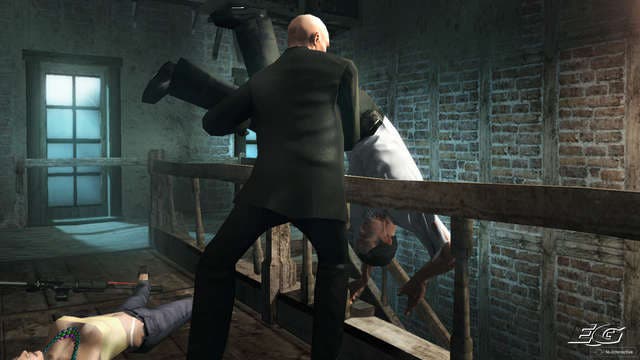Hitman: Blood Money
Hot Fuss.
Mind of a killer
Elsewhere, there's a much greater sense of being able to properly use the environment to your advantage. For example, you can hide in closets and peep out, dump bodies out of sight in appropriately sized containers, climb up lift hatches and strangle unfortunate victims standing below, plant bombs on key installations to make deaths look like an accident (chandeliers being a favourite in Blood Money) and (finally) you can conceal your weapon for quick, easy access. None of them are exactly what you'd call massive enhancements, but together they all drag Blood Money up to the standard we've come to expect in most other games of a similar ilk.
With so many more ways to get around, and more ways of playing the assassin's role, the possibilities that lay before you have opened up even more. Sure, a lot of this might go over your head if you're taking the aforementioned Path of Least Resistance, but those prepared to invest the time will feel handsomely rewarded. In literal terms, Agent 47's actions actually result in financial rewards now, giving you the chance to buy a dozen upgrades or more to each and every standard weapon in the game, including more powerful ammo, faster reload, laser pointers, scopes and so on. As you progress through the game, new upgrade tiers unlock, allowing you to effectively carve your own path regarding which weapons you prefer, and what sort of Hitman you want to be. Naturally you can pick up enemy weapons as well, giving you an even greater arsenal to choose from as you see fit.
As one of the game's most trumpeted new features, it's important not to forget the effect that Notoriety has on the way you play the game, but it's just as crucial not to overstate its importance, either. It seems that Io wanted to find some tangible means of giving players a reward for playing like a real hitman and being stealthy, but only went about a quarter of the way.
No-no-notorious

As things stand, if you make a mess of things, you can expect to pay for your indiscretions one way or another. For example, if you kill innocents, leave witnesses and incriminating evidence behind repeatedly then your notoriety rating will shoot up and the papers will show an increasingly accurate photo-fit. From there, you either have the choice of paying increasingly hefty bribes to get this rating down, or face the prospect of people recognising you and alerting security to your presence.
On paper, this sounds like a great way of encouraging players to get into the spirit of the game, but it's flawed in several crucial ways. For example, once you realise that killing every single person in a level and stealing any CCTV footage negates any chance of anyone witnessing your murder spree, you'll make it your business to do that. It's a sad, sickening sight, to be sure, but far from making you a better hitman, the persistent notoriety system actually motivates you to kill everyone, just in case they grass you up. Even if you do need to pay the bribes, you've always got plenty of spare cash so it's no big deal. It was a good idea of Io's, but in reality the temptation to 'Rambo' through the game to finish it has actually increased.
That would be fine, in itself, but in Hitman: Blood Money's case, playing it like a third person shooter and taking the path of least resistance also happens to be showing off an otherwise fantastic game in the worst possible light. Even on higher difficulty settings, the general AI behaviour is just plain dim. Shoot any patrolling bad guy and their cronies radio one another and swarm on your position immediately. As a spectacle this is a bit ridiculous (in a lemmings kind of way), but in practise it's even worse. All you ever need to do in the entire game to succeed is find a safe cul-de-sac (not hard), pick a fight with someone and safely pick off any subsequent foe one by one. Eventually, you'll have cleared all hostiles with minimal health loss and can move onto the next section and repeat the same formula until you've located your targets and moved on. There's not even an element of surprise when you encounter an enemy - your ultra helpful map gives an instant top down indication of every person on the map, helpfully colour coding them to make it even easier to tell who's about to appear around the corner.
Without labouring the point too much, if you want to get the most out of the game then the only reason you'll play Blood Money like this is as a means of 'scoping out' a level. To see what disguises work, where you can go, what those exclamation marks on the map mean, and so on. In fact, your first play through may feel like a brief tutorial, a mere taster of what's to come. Strangely, you won't spoil the surprise by seeing the whole story, but simply open out the game to allow you to scalp those Silent Assassin awards in the order of your choosing.
Save our saves

However much love you may have for Blood Money, we'd still question why Io felt it necessary to wipe your mid-level progress whenever you power down, quit to the menu or reach the end of a level. Although you have three save slots available to you (and seven chances to save on normal, three on hard, none on expert) any saves you happen to make during a session will simply disappear in any of those circumstances, meaning you'd actually have to leave your console switched on if you went out and wanted to pick up where you left off. Blood Money? Bloody Minded, more like. This petty approach to saves is mind-boggling, and only just about excusable on the basis that none of the levels are that long. Even so, for those gunning for a perfect run-through, often unique circumstances have to align, and having to do it all in one go is - to say the least - tough. Bad form, Io.
With everything taken into account, though, we had a great time with Blood Money and look forward to eventually cracking each of the 13 levels to Silent Assassin rank. It's a shame that it still doesn't work as a bona-fide shooter, because it's likely that a fair chunk of the audience will still want to play the game that way regardless of anyone's recommendations. Until Io can sort out its rudimentary AI routines and flesh out the whole package we'll be left imploring you to completely gloss over the less-than-brilliant combat, and focus on trying to be a Hitman. And when you do, the penny will drop as to what a great game this is.
Judged on that basis and played in the right spirit, Blood Money is a fine addition to the Hitman series, boasting significant improvements that make it not only a more rounded, slicker affair, but a more enjoyable one in the long run. If the impressive visual enhancements, tighter controls, more coherent narrative and bigger production values don't draw you in, the thoughtful level design and degree of freedom will keep you coming back for more. Best yet? Bloody right.
















